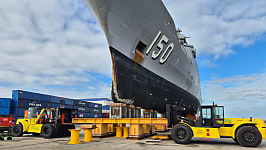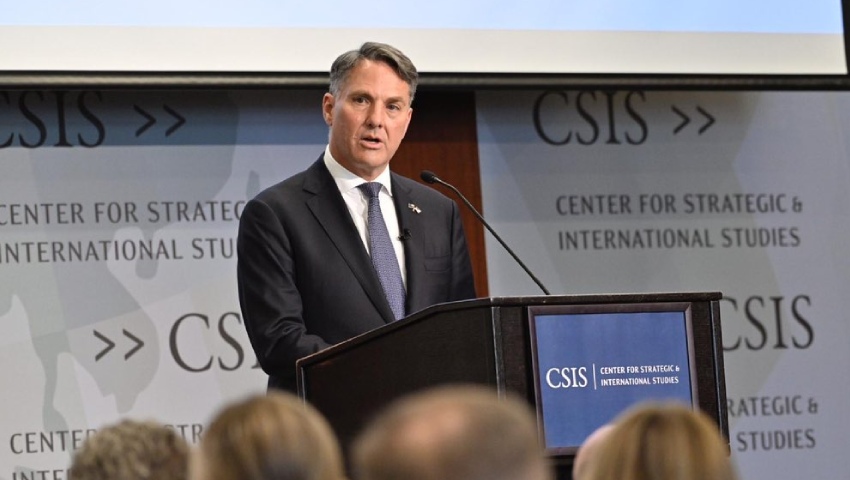The Commonwealth government is set to undertake a new review into Australia’s $270 billion defence procurement strategy in early 2023, as part of a broader push to avoid a “catastrophic failure of deterrence”.
In an address to the Center for Strategic and International Studies (CSIS) during his week-long trip to the United States, Deputy Prime Minister and Minister for Defence Richard Marles renewed Australia’s commitment to strengthening the defence and security partnership under the ANZUS treaty.
The Deputy Prime Minister called for enhanced cooperation via both joint military activities and the exchange of defence industry capability to counter what he described as a military build-up “occurring at a rate unseen since World War II”.
Minister Marles flagged the development and deployment of new weapons systems, which “challenge our military capability edge”, and pointed to the expansion of cyber and grey zone capabilities.
This mounting capability threat, he said, is against a backdrop of an “intensification of major power competition”, threatening to “transcend geographic confines”.
Given these challenges, Deputy Prime Minister Marles stressed the US-Australia alliance “can’t afford to stand still” but would instead need to contribute to a “more effective balance of military power” in the Indo-Pacific, aimed at “avoiding a catastrophic failure of deterrence”.
“Events in Europe underline the risk we face when one country’s determined military build-up convinced its leader that the potential benefit of conflict was worth the risk,” he said.
As such, Minister Marles has promised Australia would “do its share”, taking “greater responsibility for its own security”.
The Defence Minister went on to outline Australia’s $270 billion procurement strategy.
“We will make the investment necessary to increase the range and lethality of the Australian Defence Force so that it is able to hold potential adversary forces and infrastructure at risk further from Australia,” he said.
“This will include capabilities such as longer-range strike weapons, cyber capabilities and area denial systems tailored to a broader range of threats, including preventing coercive or grey-zone activities from escalating into conventional conflict.
“We will invest in the logistics, sustainment and depth required for high-intensity war fighting, including guided munitions. This will in turn require deeper engagement with industry to accelerate capability development and strengthen our supply chains.”
This procurement plan would be informed by a new Force Posture Review, which Minister Marles revealed would be conducted “early next year”.
The review would explore how to “best structure ADF assets and personnel, and how to “best integrate and operate” with the United States and other strategic partners.
Prime Minister Anthony Albanese had previously said the new review would involve:
- considerations of whether Tomahawk missiles can be fitted to the Collins Class submarines;
- reviewing progress of the Future Frigates project;
- exploring potential upgrades to weapons on the Arafura Class offshore patrol vessels or through additional Hobart Class air warfare destroyers; and
- advancing Australia’s strike weapons procurement program.
But according to Minister Marles, the government’s first priority would be advancing capability promised under the trilateral partnership with the United States and the United Kingdom (AUKUS).
This would include, but would not be limited to, the procurement of a next-generation fleet of nuclear-powered submarines.
“For a three-ocean nation, the heart of deterrence is undersea capability. AUKUS will not only make Australia safer, it will make Australia a more potent and capable partner,” he said.
“That the United States and the United Kingdom have agreed to work with Australia to meet our needs is not only a game changer, it illustrates why alliances help reinforce, not undermine, our country’s national sovereignty.”
Underpinning this approach, would be a push to “integrate technology and industrial bases”, with Australia’s inclusion in the US National Technology and Industrial Base a “vital first step”.
“But implementing it will require change,” Minister Marles added.
“During my engagements this week, I will be proposing specific measures that both sides could adopt to streamline processes and overcome barriers to procurement, investment, information and data sharing systems and export requirements.
“In recommending these steps, we all recognise that integration cannot come at the expense of robust security which protects sensitive information and technology.”
Deputy Prime Minister Marles is scheduled to conclude his visit to the United States on Thursday, 14 July.
[Related: Deputy PM looking beyond SSNs amid US trip]
Charbel Kadib
News Editor – Defence and Security, Momentum Media
Prior to joining the defence and aerospace team in 2020, Charbel was news editor of The Adviser and Mortgage Business, where he covered developments in the banking and financial services sector for three years. Charbel has a keen interest in geopolitics and international relations, graduating from the University of Notre Dame with a double major in politics and journalism. Charbel has also completed internships with The Australian Department of Communications and the Arts and public relations agency Fifty Acres.









